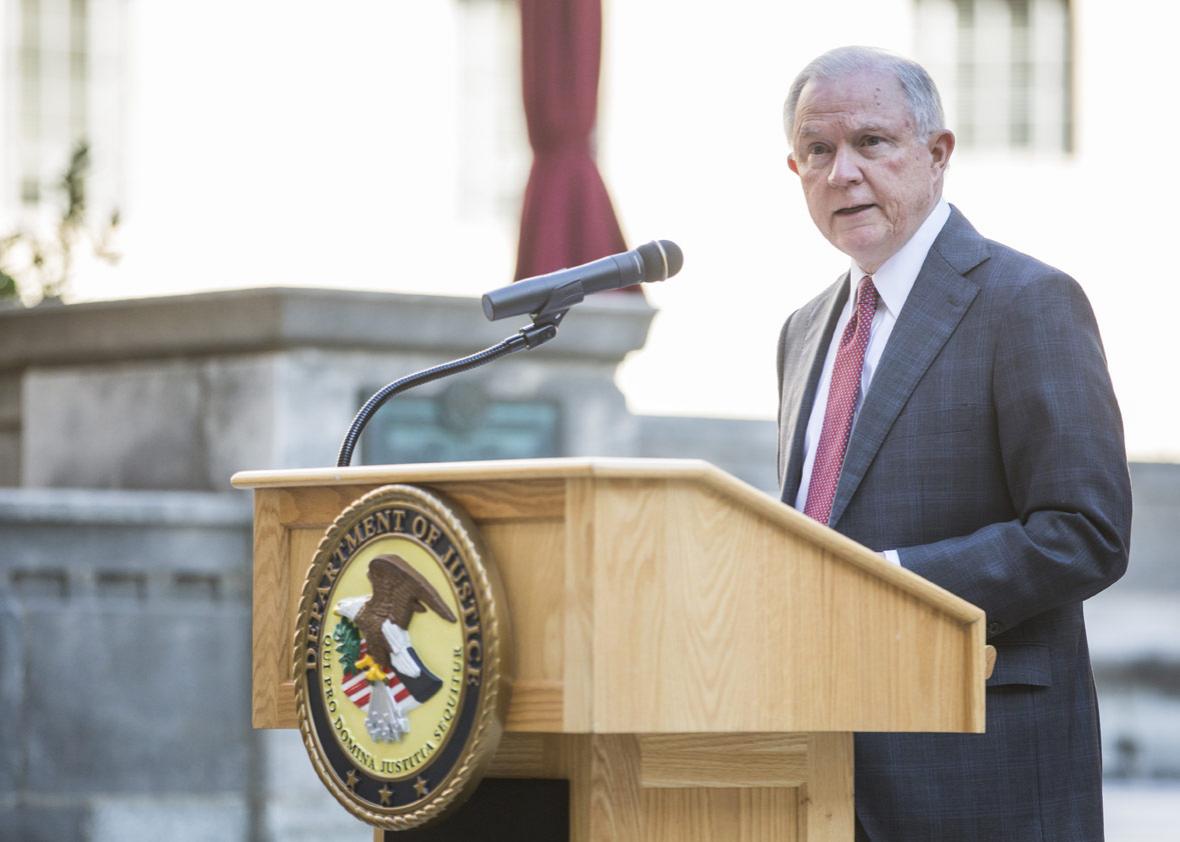The Trump administration’s latest attempt to punish sanctuary cities hit a snag on Friday when a federal court ruled the Justice Department cannot withhold public safety grants from jurisdictions that refuse to assist federal immigration authorities. Attorney General Jeff Sessions had attempted to prevent cities and states from receiving these funds unless they cooperated with immigration officials’ crackdown on undocumented immigrants. The court held that Sessions in fact has no power to attach new restrictions to the grants, rendering most of his new rules unlawful.
Friday’s decision marked the second time a court has blocked Sessions’ attempts to penalize sanctuary cities by depriving them of federal grants. It also comes on the heels of a sweeping ruling that froze the most controversial provisions of Texas’ new anti–sanctuary cities bill. Earlier this month, the White House declared that Donald Trump is “restoring law and order to our immigration system.” But in their haste to adopt a restrictionist immigration regime, Trump, Sessions, and their fellow Republicans have shown a consistent disdain for federal statutes and constitutional protections.
Consider Sessions’ latest sanctuary cities imbroglio. In July, the attorney general created new criteria for Byrne Memorial Justice Assistance grants, which dispense hundreds of millions of dollars to state and local law enforcement. Under these rules, jurisdictions would not be eligible for Byrne grants unless they collaborate with Immigration and Customs Enforcement officials. Most pertinent here, law enforcement officials would have to give ICE agents access to local jails and, if the agency is interested in detaining an undocumented immigrant, notify ICE 48 hours before that person is set to be released. Chicago sued, alleging that the new rules were illegal.
Where does Sessions get the authority to impose these conditions on Byrne grants? Nowhere, as Judge Harry D. Leinenweber of the Northern District of Illinois pointed out in his ruling siding with Chicago. The Constitution grants Congress, not the executive branch, authority to impose conditions on federal funding. And Congress has never authorized the Justice Department, which is part of the executive branch, to force Byrne grantees to work with ICE. Sessions simply usurped Congress’ authority to make new rules.
When Chicago sued Sessions over the Byrne conditions in August, the attorney general put out a Trumpian statement asserting that the city “proudly violate[s] the rule of law” by protecting undocumented immigrants. But as Leinenweber explained on Friday, it was Sessions, not Chicago, who was acting lawlessly.
It’s surprising that Sessions would try to meddle with Byrne grants given that his first foray into sanctuary city–bashing failed so spectacularly. In Trump’s first days in office, the president issued an executive order directing the attorney general and Homeland Security secretary to withhold all federal grants and funding from sanctuary jurisdictions. Multiple cities quickly filed suit to defend their sanctuary policies. Sessions’ Justice Department, which apparently realized this order would violate multiple constitutional provisions, told a federal court that in reality, the order was nothing more than a narrow warning to sanctuary cities that the government would enforce current grant conditions.
In April, U.S. District Judge William Orrick blocked the order as an unconstitutional abomination. In his decision, Orrick essentially mocked the Justice Department, writing that he would not accept the DOJ’s “implausible” interpretation as it would transform Trump’s order into “an ominous, misleading, and ultimately toothless threat.” Instead, he analyzed the text of the order and found that it infringed upon constitutional separation of powers; coerced and commandeered local jurisdictions in violation of the 10th Amendment; and ran afoul of basic due process principles.
The White House promptly complained that Orrick “unilaterally rewrote immigration policy for our Nation” in an “egregious overreach.” Ironically, that is almost exactly what Trump had done through his executive order, illegally attaching new conditions to federal funds without congressional approval. Orrick had merely enforced the law; it was Trump who tried to change it unilaterally.
Neither of the Trump administration’s unlawful immigration power-grabs is as startling as SB 4, a Texas bill targeting sanctuary cities that Sessions’ Justice Department has defended in court. Confident in their measure’s legislative success, Texas Republicans turned SB 4 into a compendium of the most draconian possible attacks on sanctuary jurisdictions. The bill compelled local police to enforce immigration law, cooperate with ICE agents, and detain potentially undocumented immigrants; it also censored local officials who wished to speak out against the law. Law enforcement officers who ran afoul of SB 4 would face massive fines, jail time, and removal from office. Government employees who criticized the measure could also be fined and stripped of their positions.
Predictably, U.S. District Judge Orlando Garcia blocked these provisions in a lengthy August ruling, holding that SB 4 is nowhere close to constitutional. The gag order plainly infringes upon freedom of speech, “punish[ing] speakers based on their viewpoint on local immigration enforcement policy” in violation of the First Amendment. A provision forcing jails to keep individuals locked up if they are suspected of lacking documentation would trammel the Fourth Amendment. The section that penalizes any official who “materially limit[s]” law enforcement from “assisting or cooperating” with ICE is too vague to comport with due process. And the requirement that local police implement federal immigration law is pre-empted by federal statute. SB 4 would circumvent that federal law, illegally thwarting the will of Congress.
This is a law that Jeff Sessions says his Justice Department “fully supports.”
When Sessions and Trump talk about sanctuary cities, they tend to tout the concept of “law and order,” alleging that these cities—and the immigrants within them—undermine “the rule of law.” But as their repeated judicial trouncings indicate, the administration and its allies don’t much care for the rules themselves. For a purported effort to restore the rule of law, the Trump administration’s assault on sanctuary jurisdictions is remarkably lawless.
